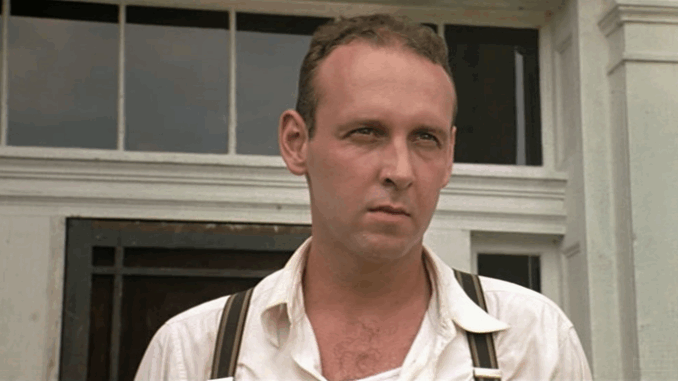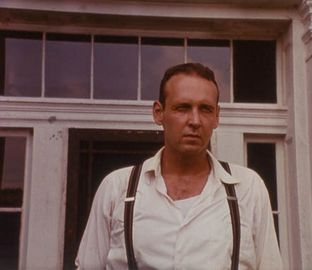
The Return of a Threat
The small town of Whistle Stop, Alabama, is not without danger, despite its picturesque charm and close-knit community. When Frank Bennett—Ruth’s abusive, estranged husband—suddenly reappears to reclaim his son, it marks a shift in tone for Fried Green Tomatoes. His arrival brings with it a wave of past trauma, fear, and menace. Frank is not merely a villain in the traditional sense; he’s a symbol of unchecked male power, of the violence that hides behind respectability, and of the systemic failure to protect women and children.
Ruth is terrified, though she hides it well. Idgie is angry but alert. And lurking quietly nearby is Sipsey, the household’s caretaker, protector, and—ultimately—the unlikely deliverer of justice.
Sipsey’s Act of Courage
In one of the film’s most memorable (and shocking) scenes, Sipsey kills Frank Bennett when he becomes violent and attempts to forcibly take his son. The act is not planned, and it’s certainly not done out of malice—it is a protective instinct born of desperation and maternal love.
Sipsey, played with profound dignity by Cicely Tyson, has been a background figure for much of the film. She cooks, she nurtures, she observes. But in this moment, she becomes the sword and the shield. Without hesitation, she delivers a fatal blow to Frank’s head, using a heavy cast-iron skillet. The sound is final. The threat is over. The child is safe.
What makes this moment so powerful is not the violence, but the silence. Sipsey does not boast, explain, or panic. She simply does what needs to be done. In a world where Black women had virtually no power—legal or social—Sipsey takes ultimate responsibility for protecting her family, even if it means risking her life.
Cover-Up and Community

Immediately after the act, the weight of what’s happened sets in. Killing a white man—especially in the Jim Crow South—was not only dangerous; it was potentially fatal for any Black person involved. But this moment, instead of fracturing the community, draws it tighter.
Idgie and Big George, without hesitation, help dispose of the body. Their plan? Disappear Frank so thoroughly that no suspicion can take root. And in a darkly humorous twist that has become iconic in film history, Frank Bennett’s remains are barbecued and served to local authorities at the Whistle Stop Café.
It’s a shocking act, but the scene never descends into grotesque sensationalism. Instead, it’s laced with irony, Southern gothic tension, and a strange kind of justice. The sheriff eats the evidence without realizing it, praising the meat, while the women and men at the café quietly protect the secret that saves Ruth and her son.
This cover-up is not framed as criminal—it is moral. Everyone involved knows that the legal system will not protect Sipsey, Ruth, or even Idgie. So they create their own justice, rooted not in law but in loyalty, love, and survival.
Sipsey’s Quiet Heroism
What makes Sipsey’s role in this scene so unforgettable is that it reframes the image of the “mammy” archetype so prevalent in Southern narratives. She is not a passive servant or comic relief. She is a moral agent, someone whose courage and instinct transcend the limitations society places on her.
She does not seek recognition. She does not explain herself. Her love for Ruth’s child, who she helped raise, is so deep and unwavering that it overrides fear. In a time when Black lives were devalued and Black voices silenced, Sipsey’s actions speak louder than any courtroom testimony.
There is poetry in the fact that the character who seems the quietest delivers the boldest act of protection. Sipsey may not wear a badge or carry a gun, but in that moment, she becomes the film’s truest enforcer of justice.
Subverting Expectations
The Frank Bennett murder subplot stands out because it so cleverly subverts the audience’s expectations. In most stories, a murder would be followed by an investigation, a trial, a moral reckoning. But Fried Green Tomatoes is not interested in punishing its characters for refusing to be victims.
Instead, the film invites us to consider that sometimes justice lies outside the confines of the law. Frank Bennett was never going to be stopped by legal means. In fact, the law would have likely sided with him, as it often did with white men in positions of power during the early 20th century.
By removing Frank through Sipsey’s decisive action, the story reclaims narrative power for the powerless. It says, without flinching, that sometimes the only way to protect life is to take a stand in the most absolute way.
The Legacy of the Scene
Over the years, the “barbecue scene” has been the subject of essays, film studies, and fan theories. Some viewers find it chilling; others find it cathartic. But all agree that it marks one of the film’s most daring and defining moments.
It’s not just about Frank’s death—it’s about what it reveals in the survivors. Sipsey’s strength. Idgie’s loyalty. Big George’s bravery. Ruth’s vulnerability and trust. Together, they form a community where justice is meted out not by courts, but by conscience.
The scene also challenges the viewer to reflect on the gray spaces between right and wrong. In a strictly legal sense, a crime has been committed. But morally? A monster has been stopped, a child saved, and a family preserved. Fried Green Tomatoes doesn’t moralize—it humanizes. It asks us to consider what we would do if someone we loved were threatened and no one else would help.
Final Reflections
Frank Bennett’s murder is a turning point not just in the narrative, but in the film’s ethical structure. Up until this moment, the story has been about healing, friendship, and liberation. But here, it adds something darker—and perhaps more honest. It acknowledges that sometimes love requires bold, even violent, action.
Sipsey, with her quiet gaze and steady hands, becomes an unlikely icon of resistance. Her skillet may be a domestic tool, but in that instant, it becomes a weapon of justice. Not revenge. Not rage. But justice.
In the end, the film doesn’t linger on the act. It moves forward—just like Sipsey does. Because in Fried Green Tomatoes, the past is never denied, but it never dictates the future. The story belongs to those who live, protect, and love fearlessly.
